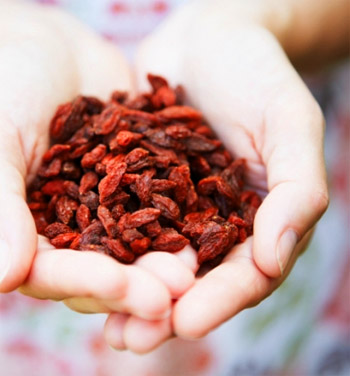|
|
|
 , ,
Font size |
Encyclopedia of Health Benefits of Berries

13. Goji Berries:
They are usually found dried and shriveled and are similar to red resins
in appearance. They are also known as wolf berries. They are usually cooked
before consumption. They are used to prepare herbal tea, wines, rice congee,
goji juice, etc. They contain 11 essential and 22 trace dietary minerals, 18
amino acids, 6 essential vitamins, carbohydrates, proteins, fats, dietary
fiber, etc.
The goji berry is also called the wolfberry. It is a bright orange-red berry
that comes from a shrub that's native to China. In Asia, goji berries have
been eaten for generations in the hopes of living longer.
Over time, people have used goji berries to treat many common health
problems like diabetes, high blood pressure, fever, and age-related eye
problems. Goji berries are eaten
raw, cooked, or dried (like raisins) and are used in herbal teas, juices,
wines, and medicines.
Research shows that eating berries -- like blueberries, acai berries,
cranberries, strawberries, and cherries -- offers some definite health
benefits. Berries like the goji berry are filled with powerful antioxidants
and other compounds that may help prevent cancer and other illnesses,
including heart disease. Antioxidants may also boost the immune system and
lower cholesterol.
Eating foods high in antioxidants may slow the aging process as well. It
does this by minimizing damage from free radicals that injure cells and
damage DNA. When a cell's DNA changes, the cell grows abnormally.
Antioxidants can take away the destructive power of free radicals. By doing
so, antioxidants help reduce the risk of some serious diseases.
Goji berries also have compounds rich in vitamin A that may have anti-aging
benefits. These special compounds help boost immune function, protect
vision, and may help prevent heart disease.
Some research suggests that goji berry extracts may boost brain health and
may protect against age-related diseases such as Alzheimer's.
Other studies using goji berry juice founds benefits in mental well-being,
and calmness, athletic performance, happiness, quality of sleep, and
feelings of good health. These are preliminary studies that need to be
repeated before definitive conclusions can be drawn.
While goji berries are a rich source of antioxidants -- and early research
shows a potentially powerful health benefit -- it's still unclear how they
stack up against other berries.
Researchers also don't know whether goji berry supplements have the same
health benefits as the actual berries.
There may be some possible herb-drug interactions with goji berries. If you
take warfarin (a blood thinner), you may want to avoid goji berries. Goji
berries may also interact with diabetes and blood pressure drugs.
Also, if you have pollen allergies, you may want to stay away from this
fruit.
Goji berries (Lycium barbarum) are the most nutritionally dense fruit on
Earth. They are a member of the nightshade family (Solonaceae), which
contains many other common vegetables such as potato, sweet potato, tomato,
eggplant, and pepper, as well as some poisonous plants like belladonna and
deadly nightshade. Native to the Himalayan Mountains of Tibet and Mongolia,
the goji berry is now grown in many other countries as well.
 Although they have only been introduced in Western countries in recent
years, gojis have been used for thousands of years in Tibet and China, both
as a culinary ingredient and medicinally. Although they have only been introduced in Western countries in recent
years, gojis have been used for thousands of years in Tibet and China, both
as a culinary ingredient and medicinally.
Unique among fruits because they contain all essential amino acids, goji
berries also have the highest concentration of protein of any fruit. They
are also loaded with vitamin C, contain more carotenoids than any other
food, have twenty-one trace minerals, and are high in fiber. Boasting 15
times the amount of iron found in spinach, as well as calcium, zinc,
selenium and many other important trace minerals, there is no doubt that the
humble goji berry is a nutritional powerhouse.
This amazing little superfruit also contains natural anti-inflammatory,
anti-bacterial and anti-fungal compounds. Their powerful antioxidant
properties and polysaccharides help to boost the immune system. It�s no
wonder then, that in traditional Chinese medicine they are renowned for
increasing strength and longevity.
In traditional Chinese medicine, the goji is said to act on the Kidney and
Liver meridians to help with lower back pain, dizziness and eyesight. They
are most often consumed raw, made into a tea or extract, or as an ingredient
in soups.
Gojis are most commonly available in dried form, and make a great snack
eaten as is, added to trail mix, muesli or oatmeal. They can also be soaked
for a couple of hours in enough water to cover them. Then the soak water can
be drained off and makes a delicious drink, or both water and berries added
to smoothies.
Please note that there can be adverse interactions if you consume goji
berries while also taking medication for diabetes, or blood pressure, or
take the blood thinner warfarin. So be sure to consult your health care
provider if that is the case.
Gojis can often be found in Asian food stores, but most of these come from
the commercial growing regions of China and Tibet, and contain high levels
of pesticides and synthetic fertilizers. Even some brands which claim to be
organic may not be, so be sure to source your goji berries from a reputable
source.
Next..
Dated 12 March 2013

|
|
|
|
|
|
|









